In today's digital landscape, your online reputation can make or break your business. Customers now have the power to publicly voice their opinions and experiences with just a few clicks, and these reviews can significantly impact your brand's success.
That's why understanding your business's reputation report is vital—it's the first and most crucial step toward building a 5-star reputation.
In this article
What is a Reputation Score?
A Reputation Score is a comprehensive measure of your brand's performance online across top business review sites such as Google, Facebook, and Yelp.
The reputation score is part of an online reputation report that encompasses what your customers publicly say about your business in their online reviews and ratings and uses this information to score your business against your competitors. It's a reflection of your brand's credibility, trustworthiness, and overall customer satisfaction.
Your customers are the driving force behind your reputation, and their feedback holds immense value. A high reputation score signifies a healthy and well-regarded brand. On the other hand, lower scores can hinder growth, stagnate your business's progress, and even lead to revenue loss.
That's why staying informed and taking control of your online reputation is crucial.
Related post: What is Reputation Management?
Get Your Free Online Reputation Report Now
Fortunately, ReviewsOnMyWebsite offers a powerful solution to help you assess and improve your brand's reputation. With our free Online Reputation Report, you can gain valuable insights into how your business is perceived by your audience.
This blog post will guide you through interpreting and understanding your Reputation Report. We'll break down the implications of your score and delve into the contents of your report, equipping you with the knowledge to make informed decisions about your online reputation.
Whether you're looking to enhance customer satisfaction, outperform your competitors, or attract new customers, this guide will empower you to unlock your brand's full potential.
How to Interpret Your Reputation Report
Okay, so you've officially got your free online reputation report. Now what? Let’s break down some of the information you’ll find on your reputation report.
This report examines the key online factors that affect your business's ability to get found by ranking high on local online searches and how your reputation appears in those searches.
Your overall score
Your overall score and grade of your business's reputation and visibility are generated by looking at multiple criteria.
Your reputation report is presented with a numerical value ranging from 0 to 100, representing your overall reputation score.
This score is determined by evaluating your business performance across several essential review-related reputation metrics such as review volume, average rating, response rate data, and review recency, each contributing up to 25 points to your total score.
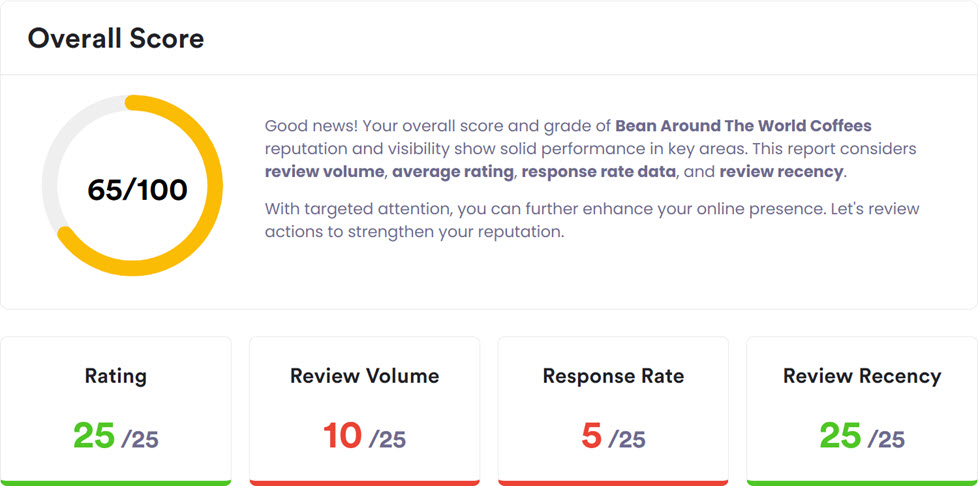
Your initial report will aggregate your score based on your business's ratings and reviews across your top platforms to date.
It's important to remember that you have significant control over your brand reputation. The key is to monitor your reputation score and leverage the data in the report to improve customer experiences.
Your ratings
The next section of your reputation report focuses on your ratings, which provides valuable insights into how your business is perceived by customers. This section comprises two key components: average ratings across top platforms and relative ratings.
Average ratings
This section reveals your business's average star ratings across the top review platforms. A higher average rating indicates that customers have had positive experiences with your brand.
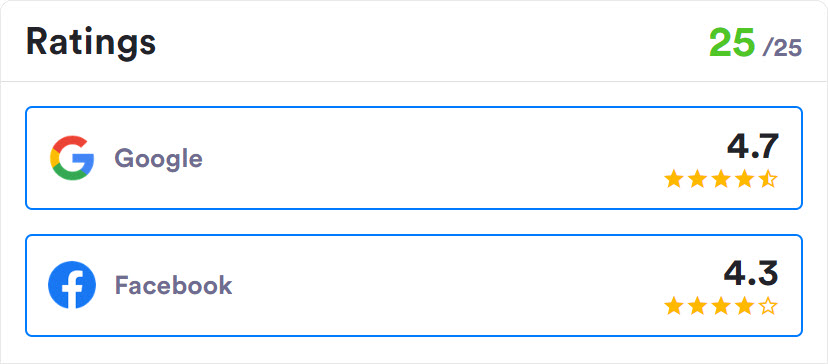
Businesses with a higher average rating are more likely to be chosen by new customers over those with a lower average rating.
Positive ratings serve as a trust signal, assuring potential customers that your brand, products, or services are reliable and of high quality.
Relative ratings
In this section, you can compare your business's rating to that of your top local competitors within your industry.
The rating summary provides a snapshot of how your business fares in comparison. It offers valuable insights into where you stand relative to your competition, allowing you to gauge your brand's reputation and identify areas for improvement.
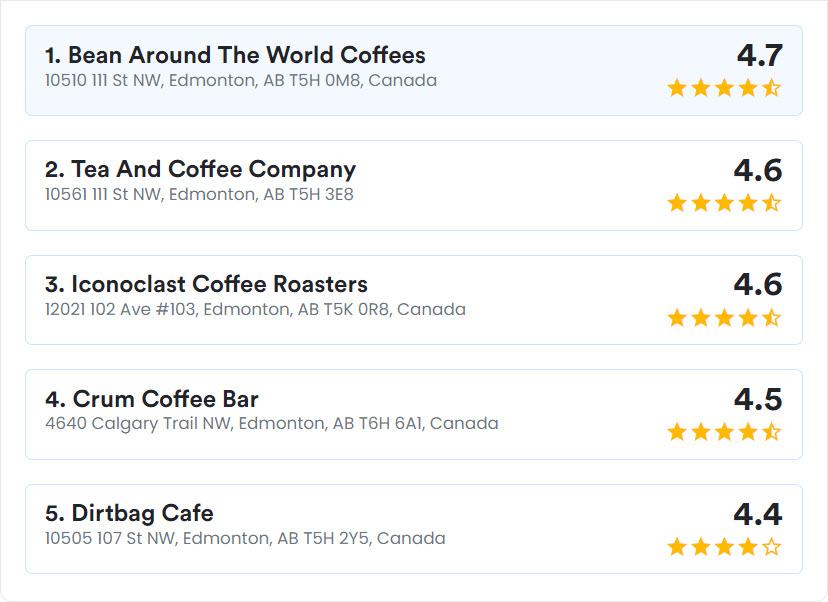
By understanding and leveraging your average and relative ratings, you can strengthen your brand's reputation and increase your chances of being chosen by customers in their decision-making process.
Your reviews
The next section of your reputation report focuses on your reviews, providing valuable insights into the feedback and experiences shared by your customers. This section is divided into two sub-sections: review count and review volume.
Review volume
Your review count reveals the total number of reviews your business has received on each prominent review platform. A higher review count signifies that customers have actively engaged with your business and shared their experiences.
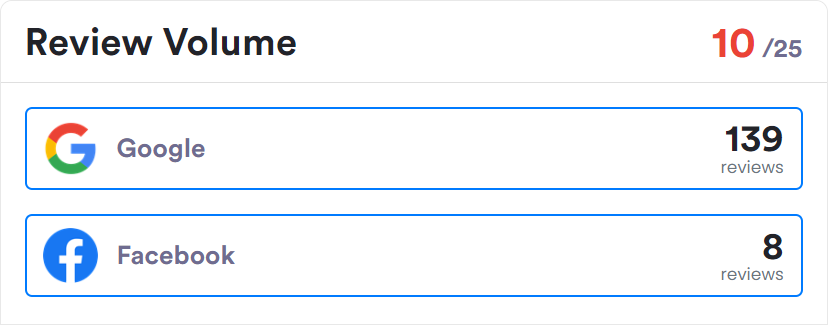
Businesses with a larger number of total reviews are generally perceived as more trustworthy and credible by potential customers. The abundance of reviews demonstrates that your brand has a track record of providing satisfactory products or services.
Relative review volume
You can compare the number of reviews your business has received on Google to that of your closest competitors with your review volume. Google reviews hold significant weight and can significantly impact your local search engine optimization (SEO) ranking.
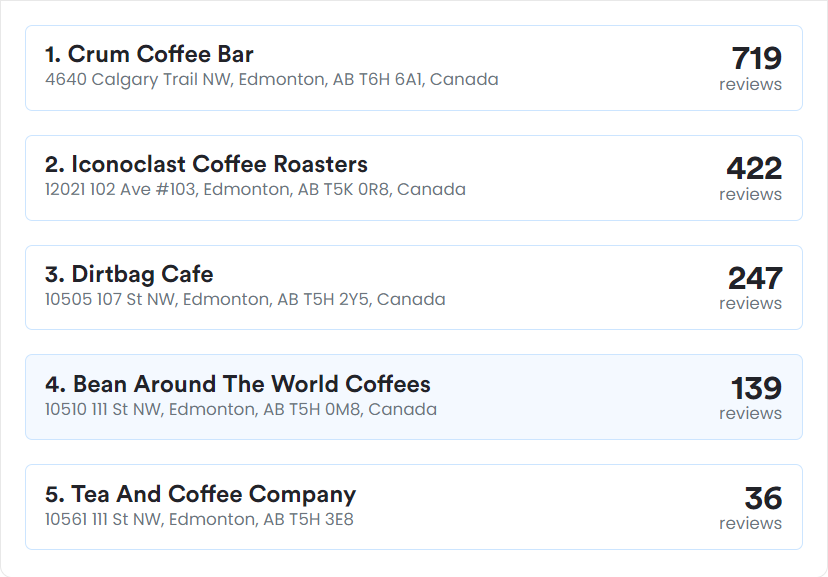
By actively encouraging customers to leave reviews through email and SMS review requests, you can increase your review volume and attract more customers.
The more positive reviews you accumulate, the better your chances of enhancing your Google ranking and standing out from your competitors.
By paying attention to both your review count and review volume, you can strategically improve your online reputation, boost customer trust, and attract more potential customers to your business.
Your response rate
The subsequent section of your reputation report focuses on your response rate, providing valuable insights into your interaction with customers and the timeliness of your responses.
This section highlights the importance of actively engaging with online reviews and managing customer feedback by examining how promptly you address your customer reviews and feedback.
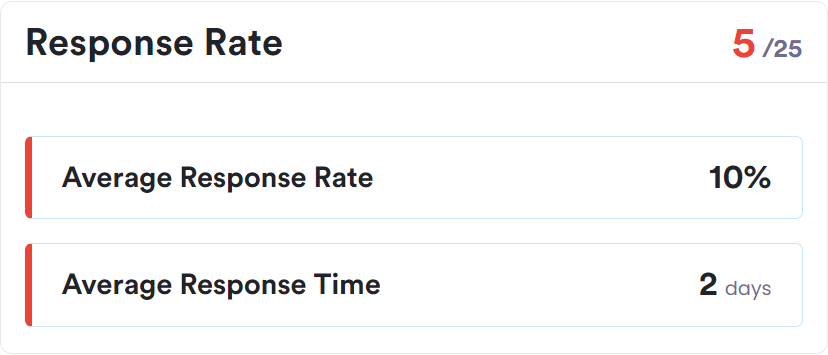
A quick and proactive response demonstrates your commitment to customer satisfaction and can help bridge any potential gaps between you and your customers.
By promptly addressing concerns, acknowledging positive feedback, and providing helpful responses, you can solidify your online reputation and build stronger relationships with your customers. This, in turn, fosters increased brand loyalty and customer satisfaction.
Your review recency
The final section of your reputation report focuses on review recency, providing insights into the freshness and relevance of your reviews. Review recency plays a crucial role in shaping consumer perceptions and decision-making.
Reviews that are more recent carry greater weight and relevance in the eyes of potential customers. A company with recent reviews indicates that it is actively engaged with its customer base and consistently delivers satisfactory experiences.

Maintaining review recency is crucial to staying ahead of the competition and attracting customers who prioritize up-to-date information when making purchasing decisions.
By consistently generating recent reviews, you position your business as a reliable and trustworthy choice among consumers.
How to Improve Your Reputation Score
Consumers identify online reviews and a business's reputation as the most important factor when making a purchase decision, such as choosing a business or service.
Therefore, the goal of every local business should be to get found on local online searches with the best possible reputation. Generating and interpreting the results of your online reputation report is just the first step.
From there, you need to use the information to improve your efforts. Here are some ways you can do that.
1. Uncover Areas for Improvement
Your online reputation report will unveil any common issues that your customers face. This valuable insight allows you to prioritize improving these areas and enhancing the overall customer experience.
By addressing these concerns, you can set yourself apart from the competition and create a positive impact on your brand image.
Additionally, leveraging positive sentiments expressed by your customers in future decision-making, marketing campaigns, and messaging can further strengthen your position in the market.
This, in turn, can positively influence your seo reputation management efforts, as search algorithms favor brands with numerous positive reviews.
2. Identify Customers' Preferred Review Platforms
Understanding which review platforms are most popular among your customers is crucial. Your reputation report highlights the platforms where you have received the most reviews.
Armed with this knowledge, you can encourage future customers to share their feedback on these platforms, leveraging the existing traction and visibility.
By focusing your efforts on platforms preferred by your target audience, you can maximize the impact of customer reviews and strengthen your online reputation.
3. Ensure Review Consistency
Monitoring the number of reviews you receive on each platform is essential to maintaining consistency.
If you notice a significant disparity in the number of reviews across platforms, it prompts you to investigate further. Is it due to customer preferences, or are you not effectively promoting certain review channels?
By understanding these patterns, you can adapt your approach and encourage customers to leave reviews where they are most likely to be seen.
Additionally, tracking the monthly review count allows you to identify any drops in feedback and take proactive steps to ramp up your efforts and generate more reviews in the coming months.
4. Addressing Negative Reviews
Negative reviews should be viewed as opportunities rather than setbacks. They provide a chance to demonstrate your commitment to customer satisfaction and rectify any past negative experiences.
Your report will help you create an effective reputation management strategy and gauge the sentiment surrounding your business online, enabling you to identify negative reviews and respond to them promptly.
By acknowledging and addressing these concerns, you can showcase your dedication to resolving issues and improving your online presence.
Turning a negative experience into a positive one can win back customer trust and demonstrate your commitment to delivering exceptional service.
4 Ways the Reputation Report Can Help Your Business Grow
Your customers are not just purchasers; they are your brand advocates. Their trust and perception of your business can make or break your success.
That's why measuring your business's reputation score is important and essential in understanding your customers and their experiences with your company.
1. Understand How Your Brand Makes People Feel
Reviews provide invaluable insights into how customers perceive and feel about your brand. Your comprehensive online reputation management report goes beyond numbers, providing snippets of top reviews that clearly understand how your brand is perceived online.
You'll gain first-hand insights into the emotions and experiences your customers associate with your business, allowing you to tailor your strategies to meet their needs effectively.
2. Boost Customer Loyalty
Customer loyalty is the key to long-term success, increased retention rates, and growing revenue. By knowing your average star rating and collecting all customer reviews in a single report, you gain the opportunity to engage with your customers directly.
Responding to their feedback, understanding their needs, and consistently providing an enjoyable experience can significantly enhance customer loyalty.
With your online reputation report, you'll have the tools to build lasting relationships with your customers and foster brand advocates who will continue to support your business.
3. Improve Your Business's Market Value
Positive reviews are not only a testament to your brand's excellence but also a driver of your business's market value.
The detailed comparisons against your top competitors in your online reputation report will offer you a clear insight into your brand's position in the market.
By identifying areas for improvement and leveraging your strengths, you can strategically enhance your brand's reputation, leading to increased credibility and recognition within your industry.
Elevating your market value can attract more customers, open new opportunities, and position your business as a leader in your field.
4. Discover Your Weak Spots and Improve Them
Your report doesn’t just deliver average star ratings and review counts; it also sheds light on areas for improvement and allows you to see where you might be lacking in managing your online reputation.
By analyzing this feedback, you can pinpoint your weaknesses and take proactive measures to address them.
This invaluable information empowers you to deliver an increasingly enjoyable experience for future customers, ensuring that every interaction with your brand exceeds expectations.
Frequently Asked Questions
What factors contribute to my brand's reputation score?
Your brand's reputation score is influenced by various factors, including your online star rating and reviews from business listings. Poor quality products or services, a negative user experience, and failure to meet customer expectations can result in negative reviews and lower star ratings, which in turn impact your overall reputation score.
What is considered a good reputation score?
While a perfect five-star rating is ideal, a reputation score averaging four stars or above is generally considered good. It's important to note that achieving a perfect five-star rating across all platforms is challenging, so aiming for a consistent rating of four stars or higher will help ensure a strong online reputation for your brand.
What is a reputation report?
A reputation report card consolidates customer reviews and star ratings to provide you with a comprehensive overview of your online reputation. It allows you to see which platforms generate the most reviews, your average star rating, and how you compare to your local competitors. This report card enables you to assess your brand's online reputation and make informed decisions to improve your standing in the market.
How often should I review my reputation report?
Regularly reviewing your reputation report card is essential for staying informed about your brand's online reputation. It's recommended to assess your report card at least monthly to track any changes in your ratings, review volume, or competitor comparisons. By monitoring your reputation consistently, you can identify trends, address potential issues promptly, and continually work towards improving your online reputation.
Can I use my reputation report to improve my search engine ranking?
Yes, your reputation report card can indirectly impact your search engine ranking. Search algorithms take into account factors such as review volume, average rating, and overall sentiment when evaluating the credibility and relevance of businesses. By actively managing and improving your online reputation based on insights from your report, you can enhance your search engine optimization efforts and increase your visibility in local online searches.